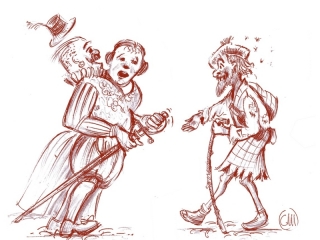Dave Watt shockingly reveals that colourful, honest and fun-loving Scots have not always been revered beyond our own shores…
The traditional picture in Scotland of we noble Jocks being welcomed all over the world for our forthright honesty, creativity, general lovability – and not being English football fans – took a bit of a knock for me earlier this year when I read an interesting book, The Scots Abroad by TA Fischer.
Fischer tends to concentrate on the Scots in northern Europe from the sixteenth to the early twentieth century and if Burns requests the giftie gi’eing us the chance ‘’tae see ourselves as ithers see us’’ it certainly does that. For example, in Danzig and Stralsund on the Baltic coast, the early sixteenth century immigration of Scots was banned outright for twenty years and thereafter Poland and Prussia adopted strict quotas for the incoming Caledonian hordes.
In Brandenburg, the Markgraf Albrecht Duke of Prussia issued an order ‘‘forbidding Scotch vagabonds to roam about in the country because they are the ruin of our own poor subjects, taking away their living and reducing them to beggary.’’ The order went on to accuse the Scots of ‘frequently using false weights and measures’ and restricted their dealings to the annual trade fairs where their shady activities could be watched more closely.
In Poland, the Cutlers Guild of Krakow issued an appeal to King Casimeirz III describing the ruin of their businesses by ‘cunning Scots’ peddling inferior goods to the farmhouses so that the local peasantry no longer came into the towns to buy trade goods.
The ‘cunning’ of the Scots is a recurring theme and they were accused of bribing customs officers, cheating other traders, selling short measures and generally conning the population at large. In fact, this notion of the devious Jock as a slippery customer was so prevalent, that in Lithuania a common saying up until the early twentieth century was, ‘With a Scotsman or a priest – don’t begin a lawsuit’.
Scots immigrants were paired with the other familiar bogeymen, Jews and Gypsies and a ‘poll tax’ was laid on all three groups
In seventeenth century Poland, Scots immigrants were paired with the other familiar bogeymen, Jews and Gypsies and a ‘poll tax’ was laid on all three groups – a florin to be paid by each pedlar and an additional two florins if the upwardly mobile spiv owned a horse. Although this was apparently reduced in 1613 to two florins and fifteen groschen, the tax was extended to include the goods owned, thus increasing the tax further. A bit like cutting taxes and then jacking up VAT, really. Eventually, after lengthy negotiations and some considerable pressure from James VI, the King of Poland agreed to give the Scots the same treatment as other foreign merchants in the country.
Following this flexing of diplomatic muscle by James, the situation tended to improve generally for Scots in the Baltic states although several continued their specifically anti-Scottish stance until well into the eighteenth century.
The scene: Sainsburys, Danzig 1596
Frau Schmidt: ‘‘Oh God. Terrible news. Some Scotches have moved in downstairs from me.’’
Frau Krupinski: ‘‘Oh well, there goes the neighbourhood. House prices will drop like a stone.’’
Frau Schmidt: ‘’Yes, and they’ll be up all night playing their bagpipes and tossing their cabers all round the house….’’
Frau Krupinski: ‘‘….and the smell of porridge on the stairs.’’
Frau Schmidt: ‘‘Once you let one in they send for their relatives back in Scotchland and next thing you know the streets are full of them jabbering away in Scotch and trying to borrow ten pfennigs for a tankard of Liebfraumilch…..’’
